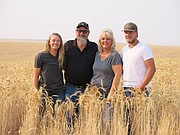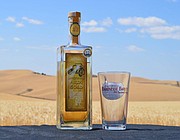Local seed grower making big noise in malt industry
A wheat farmer in Lind with family roots that date back decades, James Wahl and family understand the risks associated with agriculture. So, when he decided to throw caution to the wind to embark on another risky venture, he more than likely left a lot of folks including his wife Rena and two children, Maya Jane and Dane scratching their collective heads in wonderment?
But his gamble is beginning to pay big dividends as the family’s new business, MJW Grain Inc., which markets malted triticale and rye grains to the beer and spirits industry, is fast gaining a name for its self.
“Margins are razor thing in agriculture, so we began looking at a commodity with added value and made a decision about four years ago to raise triticale,” James said. “When we landed a couple of seed contracts with TSS in Connell, we made the switch from raising wheat.”
Triticale is an heirloom grain that is a cross between rye and Durham wheat, first bred throughout Scotland and Germany in the late 19th century. It is low in gluten and high in lysine. Triticale combines the yield potential and grain quality of wheat with the disease and environmental tolerance of rye.
The Wahl family had grown wheat for five generations. Jameses great-great grandfather Edward and his wife Lydia were Volga Germans who emigrated from Russia in the late 1800s. They came through New York like many immigrants and then made their way to Walla Walla and eventually to Lind. They had 13 kids and farmed old-school rye and Russia Red and Turkey Red wheat from the seeds they brought them.
James grew up on the farm. He graduated from Lind High School in 1983 and eventually joined the Peace Corps and was a volunteer in Honduras.
“When I came back state-side I attended the Art Institute of Seattle and worked as a professional photographer after graduating. I did that for few years,” James said. “I met my future wife (Rena) in Seattle. She was a Peace Corps volunteer too and had spent time in Guatemala.”
After the two married, they eventually relocated to Lind and made the transition to farming. In 2016, his dad Doug and mother Phyllis bought a home in Ritzville and James and Rena moved back into the house James grew up in. They continued raising wheat for many years until James decided he wanted to go in a different direction. He hasn’t looked back since.
“Vertically integrating this farm – just raising and selling wheat to the elevators wasn’t cutting it,” he said. “It could work if you don’t have payments to make, but I am paying off the land and have children in college, so we had to see if we can push the envelope a little bit.”
And push it he did.
“We first became interested in growing triticale for malts because my dad wanted to work with a product he had more control over,” said Maya Jane, CEO of MJW Grain Inc. “Wheat markets are so volatile and we didn’t have any say as to where it went or who consumed it so dad did a lot of research to find out if there were other uses for the triticale — turns out there were.”
MJW Grain Inc. was formed about 18 months ago. The company had its grain malted for the first time last year. Soon thereafter, James hit the road to market the product.
“We had about 3 tons malted to a pale trit at Palouse Pint in Spokane,” James said. “I then made up some business cards, hit the road, and knocked on every brewery door in Seattle.”
James recalled spending a lot of windshield time on the highways and byways of Washington, Idaho and Eastern Oregon. His persistence paid off in a big way.
“We went from selling one bag of malt — I gave away a lot — to selling it to clients by the ton — so we’re on the upward swing. Now some of the best breweries in Seattle, Spokane and Idaho are working with our stuff and they really like what they are seeing,” James said. “Terminal Gravity in Enterprise, Oregon is making a logger with our triticale pale malt and they love it. They send it all to Portland — can’t get enough of it. Those are the kind of clients we like.”
Additional breweries Maya Jane said MJW Grain Inc., “proudly supply our specialty malts to” are Ten Pin Brewery in Moses Lake, Bellwether Brewing in Spokane — which was just named Best Brewery in Spokane by Inland Northwest, Big Time Brewing and Elysian Brewery in Seattle and MickDuff’s Brewing in Sandpoint, Idaho.
Bellwether, she, said, is their most active brewery.
“They just released a beer called Weird Rye made with our rye malt. They feature us at events and talk about our farm,” Maya Jane said. “Customers want to know where the beer is coming from ands it’s kind of cool when they tell them it’s from a farm in Lind.”
Pretty high praise for a grain they had little experience with.
“We raised rye for the first time in a generation in Adams County. We had nowhere to go with it — no market for it — it was completely by faith but we wanted to give breweries and distilleries an option,” James said. “Our yield was only between 1/4 and 1/2 ton because we made a few mistakes along the way growing it for the first time. But the quality of the rye was good and the flavor of the malt was phenomenal and well received. Heritage Distilling in Gig Harbor is now our biggest client for it. Using our rye, they were for the first time in their history able to stamp 100 percent Washington State product on the sides of their whiskey and bourbon bottles.”
It did take a great leap of faith to move away from a crop the Wahl family had been growing for five generations and into a market James had little to no knowledge of, but he’s is quick to tell you he received great deal of guidance and encouragement along the way.
“Bill Myers with Joseph’s Grainery in Colfax is a great sounding board and mentor for me. He’s an amazing farmer who has gone down the road with marketing and vertically integrating his farm,” James said. “He raises old-school barley — Baroness Barley for two of the biggest flagship breweries in Washington. Westland Distillery runs his barley too as single malt. It’s because of him and others I’ve gotten to know we think we are running in the right direction. This new venture is a huge risk — but agriculture itself is a big gamble.”
Some might consider James a visionary; others might just consider him lucky. But one thing no one can question is his knack for entrepreneurship as producing quality malts is just the tip of the iceberg for the Wahl family.
“Our vision is now is to be a farm to table business — that’s what we’re about. We want build our own distillery, brewery, tap house and restaurant in a high traffic area in Ritzville. It’s a huge endeavor, but if we pull it off we’ll end up with about 30 employees, and that will be good for the community,” James said. “Our hope is to entice other breweries, distillers, bakers and millers to look at this area. That would make this a destination place where people will stop and hang out for a while and not just drive through here.”
I don’t necessarily consider myself a betting man, but if I were, I sure wouldn’t bet against James and family pulling it off.







